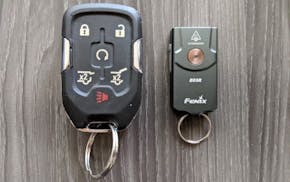Q Not being a motorhead, I have a couple of maintenance questions for you. My wife drives a '99 Lexus ES300 with only 77,000 miles on it. The owner's manual doesn't seem to recommend transmission fluid flushes unless operated in "severe" conditions such as pulling a trailer, idling for long periods, dusty conditions and so forth. In this case, it recommends fluid service at 60,000 miles. I don't think she qualifies for "severe" service, but what do you think?
Also, she only puts on about 300 miles per month, so do we need to change engine oil more often than once per year?
A I'm not sure any vehicle operated in Minnesota isn't automatically operated in severe service! In checking my Alldata database, I see that Lexus/Toyota suggests transmission fluid service every 15,000 miles under severe service, so if she's planning to keep the vehicle for a number of years I'd suggest have the transmission fluid flushed and 100 percent replaced and the filter changed.
The manufacturer's recommendation for oil changes under "severe" service is 5,000-mile intervals, which I think is reasonable. So an oil and filter change each spring makes perfect sense. And don't forget to check and replace the air filter every 30,000 miles. Personally, I'd also suggest that same interval for the engine compartment-mounted fuel filter.
Q I have a '97 Town Car. The antitheft alarm goes off at random -- in the middle of the night or in a shopping center parking lot, you never know. I disconnect the battery cable at night because I don't trust it. The only way to silence the alarm is to use the ignition key in the driver's door lock. Help!
A The carmaker lists four actions that will activate the alarm system -- opening a door without first unlocking it, removing the luggage compartment lock cylinder, opening the hood or tampering with the ignition switch lock cylinder.
I'd focus primarily on the front-door lock switches and the "door open" warning-light switches. A scan tool can identify fault codes associated with the alarm and security system.
Q I bought a new 2010 Impala sedan. I've had it back to the dealer four times for routine oil changes. Each time they have overfilled it by a half quart to as much as a full quart of oil. They tell me this will not harm the motor and not to worry about it -- but the owner's manual says to not overfill the oil above the "full" line on the dipstick or it might damage the motor. Who's right?
A Technically, the owner's manual. But typically, overfilling the crankcase by a half quart of oil is not harmful. Even a full quart usually won't hurt anything.
Engines tend to be self-correcting in terms of too much oil. They usually blow it out of the PCV (positive crankcase ventilation) system or burn it off without harm. The only damage that might occur from excess oil would be if the oil level were so high that the crankshaft whipped and foamed the oil, causing a loss of oil pressure.
With all that said, if the oil level significantly overfilled, I'd ask the dealer to drain the excess before leaving the dealership.
Q Every year when the temperature goes below 25 to 30 degrees, my 2002 Intrepid "whistles" off and on. Do you know what causes this? Should I do something about it?
A Most cold-weather "whistles" involve the hoses and ductwork for the engine's air induction system. Stiff plastic and/or seals in the system may allow a small air leak that whistles as air is drawn through the system into the engine. As long as the air leak is upstream of the air filter and mass airflow sensor, no significant problem. But an air leak downstream from these components, or around the throttle body or intake manifold, should be fixed.




